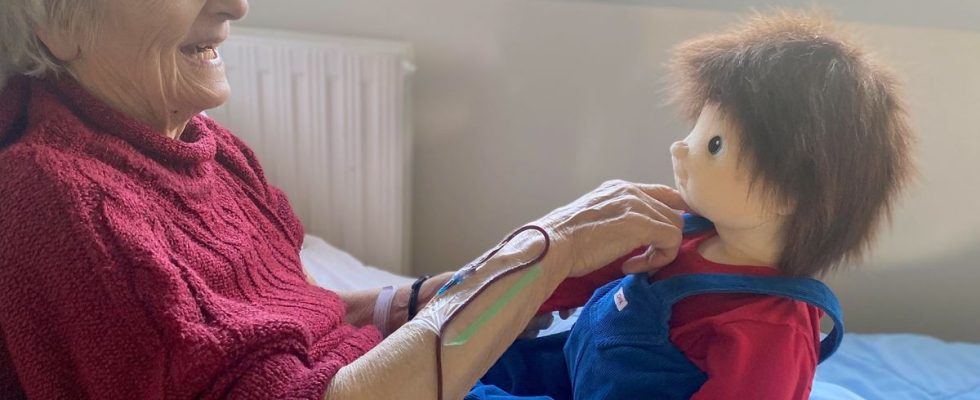“If you don’t break it, you can take it.” » A small, frail voice welcomes Céline Nezet into the hospital room. On this rainy December afternoon, the head of the care unit at the Rennes private hospitals in Cesson-Sévigné came to collect Johan, a doll with the features of a little boy whose company the old lady seems to enjoy. “This patient takes care of him very well, she talks to him, puts him to bed and sometimes gives him food,” recognizes the healthcare executive.
It was she who had the idea a few months ago to recruit Johan and Léa into her department, arousing the disbelief of her colleagues. “Everyone asked me what these dolls were going to be used for,” she remembers. The presence of dolls in this multi-purpose medical unit which welcomes quite elderly patients may indeed be surprising. More than a gadget or entertainment, it is actually an alternative therapy used for people suffering from serious cognitive disorders such as Alzheimer’s disease.
“The presence of these dolls reassures them”
This doll therapy has already been applied for several decades in countries such as the United States, Sweden and Canada. In France, these empathetic dolls, whose weight and size are close to those of a baby, have also appeared in certain nursing homes and hospitals. Objective: to reassure Alzheimer’s patients and calm their anxieties. “For people suffering from dementia, it is important to maintain benchmarks to preserve autonomy,” emphasizes Céline Nezet. Dolls can play this role by bringing back memories for some. »
Each time the medical teams sense a patient who is a little anxious or confused, they no longer hesitate to take out the dolls. “I had never heard of it before, but I immediately found the idea interesting,” says Clément, a young nurse. And conclusive, according to him. “The presence of these dolls reassures them, they communicate and express emotions when they have them in their arms,” he assures. This therapy is of course mainly aimed at women. “But we still have a gentleman with whom it works,” says Céline Nézet.
It is also not a miracle solution for all patients. “It doesn’t work with everyone,” emphasizes the health executive. This depends on the stage of progression of the disease but also on each person’s personal experience. For example, we tried with a lady who was bored in her room. So we tried to give her a doll, but we could see that it was complicated for her. And we learned later, with her husband, that this woman had lost a child. »
A non-drug approach
In the event of a crisis, empathetic dolls can also be a valuable tool to avoid physical or chemical restraint of the patient. “We use them for very agitated people who are trying to deperfuse themselves, for example,” explains Clément. Having an object in their hands will keep them busy. And this will prevent us from having to resort to medications to calm these people down. »
Increasingly popular in hospitals, this alternative method can however raise questions among the relatives of patients, disconcerted to see their relative with a doll in their arms. Even criticism, some accusing medical teams of infantilizing patients. But, since Johan and Léa joined her service, Céline Nézet has never experienced reactions of this kind. “And if that were to happen, then I would explain the benefits of these dolls on the well-being of patients,” says the head of the care unit, who is already thinking of acquiring others.

